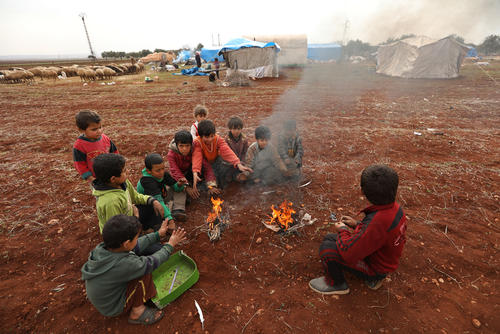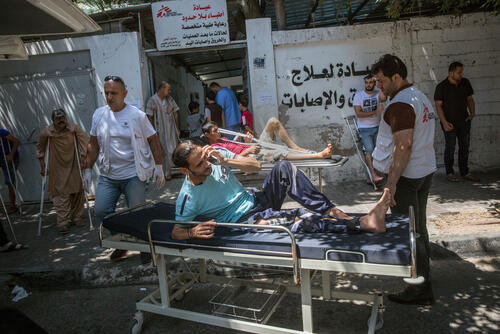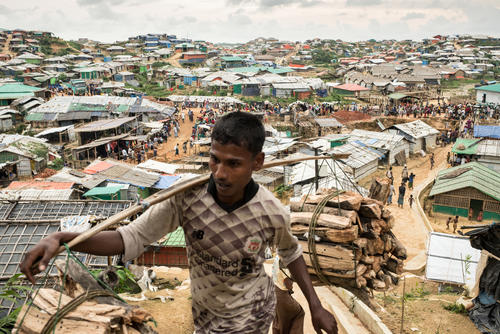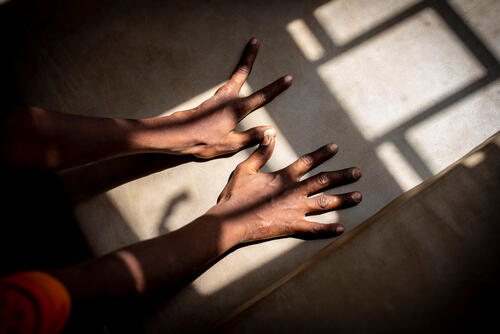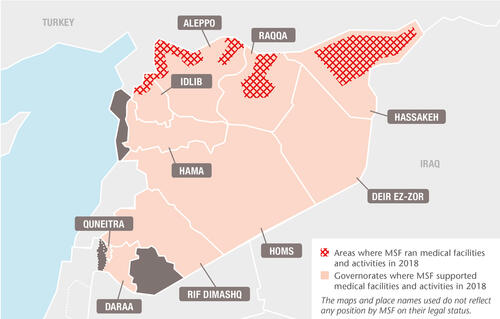
569,300
569,3
22,500
22,5
17,800
17,8

16,900
16,9
15,500
15,5
9,070
9,07
Civilians, civilian areas and civilian infrastructure, including medical facilities, came under direct fire again in 2018.
Thousands of people were killed or wounded, and many more driven from their homes. Médecins Sans Frontières (MSF) continued to operate in Syria but our activities were severely limited by insecurity and access constraints.
Our teams conduct independent evaluations to determine medical needs and what assistance we provide. In areas where access could be negotiated, we ran or supported hospitals and health centres and provided healthcare in displacement camps.
In areas where no direct presence was possible, we maintained our distance support, consisting of donations of medicines, medical equipment and relief items; remote training of medical staff; technical medical advice; and financial assistance to cover facilities’ running costs.
Northwest Syria
Thousands of people displaced by the fighting around Damascus, Homs and Daraa settled in the northern governorates of Idlib and Aleppo in 2018.
MSF teams delivered maternal healthcare, general primary healthcare and treatment for non-communicable diseases (NCDs) through mobile clinics, distributed relief items and improved water and sanitation systems.
We also organised mass vaccination campaigns in and around the camps, and supported vaccination programmes in health facilities.
We supported primary and secondary healthcare in several hospitals and clinics around Idlib and Aleppo with a variety of services such as outpatient and inpatient departments, emergency rooms, intensive care units, operating theatres, blood banks, maternity wards, and treatment for NCDs and thalassemia, all in coordination with local authorities.
In Kobane/Ain Al Arab, in northeast Aleppo governorate, we continued to work with the local health authorities to re-establish basic health facilities, providing outpatient consultations, vaccinations, psychological support and maternal healthcare.
Meanwhile in Atmeh, in Idlib, we continued to run a specialised burns unit that provides surgery, skin grafts, dressings, physiotherapy and psychological support.
An average of 150 procedures a month were performed in 2018, and severe or complex cases were referred to Turkey by ambulance. When the Atmeh camps were hit by severe flash floods in December, we distributed tents, blankets and other relief items to the worst affected.
Due to changes on the ground and shifts in needs, some projects in the northwest were handed over to local authorities in 2018, while others were managed remotely.
In northern Idlib, however, we were able to establish co-management partnerships with three reference hospitals. This entailed developing medical strategies and protocols with the hospital directors, supporting all services, donating drugs and other medical supplies, and covering the running costs, including staff salaries.
MSF also supported lifesaving medication and follow-up for almost 100 patients in Idlib who had received kidney transplants.
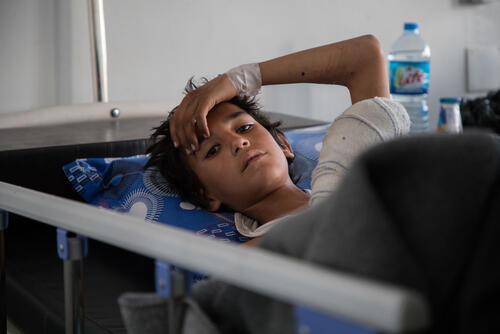
Northeast Syria
Fighting continued in parts of Deir ez-Zor governorate, resulting in further displacement and civilian casualties, with many war-wounded arriving at MSF facilities in northeast Syria.
Elsewhere in the governorate, and in Hassakeh and Raqqa, the situation was relatively calm and people previously displaced by heavy fighting and offensives in Raqaa and Deir ez-Zor began returning home – to areas where the health infrastructure had been largely destroyed and entire cities and villages were littered with landmines and unexploded remnants of war.
Our teams in Hassakeh and Raqqa treated hundreds of patients wounded by landmines, booby traps and explosive ordnance in 2018.
We helped to rehabilitate health facilities in Hassakeh, Raqqa and Deir ez-Zor governorates and supported a wide range of services, including surgery, physiotherapy, maternal, reproductive and mental healthcare, paediatrics, vaccinations, blood banks and treatment for NCDs, in coordination with the local health authorities.
In Raqqa and Tabqa, we provided primary healthcare and mental health services, and ran a leishmaniasis treatment programme, handing over our Tabqa clinic to the Tabqa Health Council in October.
We also ran a thalassemia programme at Tal Abyad hospital, through which our team performed 2,606 blood transfusions and started 226 patients on chelation therapy.
Teams working in displacement camps offered maternal and mental healthcare, conducted vaccinations, distributed mattresses, blankets and hygiene kits, and set up water and sanitation services. In Ain Issa camp, we also ran a dressings room, treated malnutrition and NCDs, and provided mental healthcare and hospital referrals.
In 2018, MSF was one of the only organisations providing medical assistance inside the city of Raqqa, where we ran a primary healthcare unit and a stabilisation point.
We started rehabilitating parts of Raqqa national hospital, continued to support the paediatric, maternity and surgical wards of Tal Abyad hospital to the north, and supported or administered vaccination campaigns across the governorate.
Damascus and central Syria
As the battle for East Ghouta intensified, we struggled to assist communities who had been under siege for more than five years.
In the first two weeks of the offensive, between 18 February and 3 March, the makeshift hospitals and medical centres that MSF was supporting from neighbouring countries reported 4,829 wounded and 1,005 dead. The influxes of dead and wounded continued, but the situation became too chaotic to collect reliable data after that point.
At the start of the battle, we were supporting 20 medical facilities – some almost entirely, others as one partner alongside other NGOs. By the end, all but one of these facilities had been destroyed or abandoned and our activities in the area came to an end.
North of Homs city, we provided remote support to eight rural hospitals and health centres until May, when the warring parties reached a settlement and the Syrian government took administrative and military control of the area, at which point the medical networks we had been assisting ceased to exist.
Daraa and Quneitra governorates
In June, as the control of Daraa and Quneitra changed hands, we had to end our support to eight health facilities in the region, where we had been offering medical, technical and logistical assistance to improve access to care for displaced people and local communities.
We set up a mental health helpline at the end of 2017, and also ran a remote ‘telemedicine’ service for the first six months of 2018.



